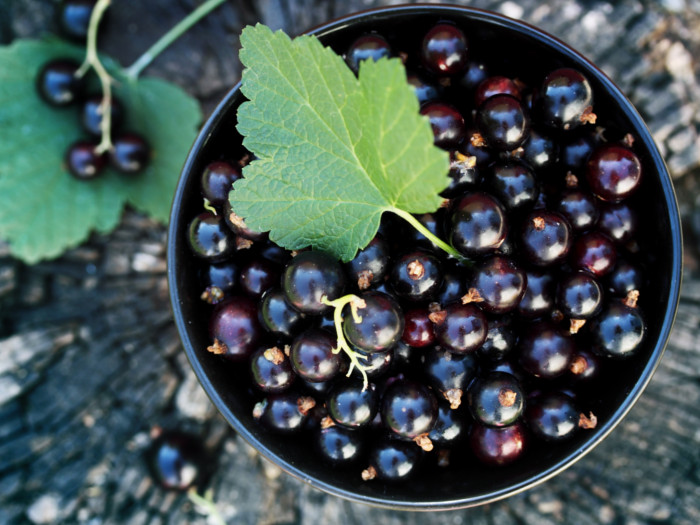Black currant is a delicious and popular type of berry that packs a nutritious punch and can provide a number of health benefits if you add it to your diet.
What is Black Currant?
Blackcurrant (Ribes nigrum) is a small, woody, and berry-producing shrub that grows widely in Europe and parts of Asia. This shrub is cultivated extensively and grows in the wild, producing bunches of dark purple or nearly black colored berries, which have a rich and woody smell and a unique sour flavor. While they can be eaten raw, these berries are most commonly cooked, as this can bring out the sweetness, making them more palatable.
The active ingredients in this plant can also be found in the leaves and above-ground parts, which have been used in various traditional remedies. These plants can now be found in the United States, but it was long believed that these berries could spread floral infections, so the plants were banned, which is why black currant remains much more popular in Europe. [1]

Blackcurrants were banned in the US in the early 1900s because they spread a fungus that kills white pine trees. Photo Credit: Shutterstock
Serving Size : Nutrient Value Water [g] 81.96 Energy 63 Energy [kJ] 264 Protein [g] 1.4 Total lipid (fat) [g] 0.41 Ash [g] 0.86 Carbohydrate, by difference [g] 15.38 Calcium, Ca [mg] 55 Iron, Fe [mg] 1.54 Magnesium, Mg [mg] 24 Phosphorus, P [mg] 59 Potassium, K [mg] 322 Sodium, Na [mg] 2 Zinc, Zn [mg] 0.27 Copper, Cu [mg] 0.09 Manganese, Mn [mg] 0.26 Vitamin C, total ascorbic acid [mg] 181 Thiamin [mg] 0.05 Riboflavin [mg] 0.05 Niacin [mg] 0.3 Pantothenic acid [mg] 0.4 Vitamin B-6 [mg] 0.07 Vitamin A, RAE [µg] 12 Vitamin A, IU [IU] 230 Vitamin E (alpha-tocopherol) [mg] 1 Fatty acids, total saturated [g] 0.03 16:0 [g] 0.02 18:0 [g] 0.01 Fatty acids, total monounsaturated [g] 0.06 16:1 [g] 0 18:1 [g] 0.06 Fatty acids, total polyunsaturated [g] 0.18 18:2 [g] 0.11 18:3 [g] 0.07 Sources include : USDA [2]
Nutritional Facts
Nutritionally speaking, these small berries are a rich source of vitamin C, packing more than 3 times the amount of ascorbic acid you need into less than a one-cup serving. These berries also boast high levels of B vitamins, such as thiamin and pantothenic acid. A 100-gram serving only contains 63 calories, but a wealth of essential minerals, including iron, calcium, magnesium, and copper. This is in addition to the range of antioxidants, including anthocyanins and flavonoids, which provide even more health benefits. These berries also contain measurable levels of omega-3 and omega-6 fatty acids, making them quite unique among fruits. [3]
Health Benefits
The many health benefits associated with black currants include lowering cholesterol, relieving symptoms of rheumatoid arthritis, and easing insomnia, among others.
- Protect the immune system with its high level of vitamin C
- Lower cholesterol, which can lower the risk of atherosclerosis and cardiovascular diseases
- Improve joint health and reduce inflammation [4]
- Boost skin appearance and prevent dry skin
- Improve vision and slow the development of macular degeneration
- Optimize the digestive system and eliminate symptoms of constipation
- Prevent circulatory problems, which can improve energy levels
- Slow down hair loss
- Speedup the healing process from flu [5]
- Relieve congestion and respiratory issues
- Aid sleep issues and increase energy levels
- Minimize the symptoms of herpes
- Protect against pathogens
- Antioxidant, antimicrobial, and antiviral
- Treat a sore throat
Uses
There are many different ways to use black currant in cooking, such as the following:
- Jams
- Jellies
- Desserts with the mashed or cooked berries
- Black currant wine
- Black currant tea or tincture
- Black currant essential oil derived from the seeds
These berries are also commonly juiced, and can further be made into various liqueurs that are popular in many cocktails. You can find supplements of blackcurrant in capsule and powder form as well [6]
Depending on where you are in the world, you may find it easy to find various black currant-containing products, as they are particularly common in Europe. [7]
Black Currant Side Effects
Despite the many health benefits of these common berries, there are a number of side effects associated with consuming too much.
- Due to the presence of gamma-linolenic acid, some people report diarrhea or headaches after consuming too many black currant berries.
- Some people may also have problems with blood clotting, so if you have a bleeding disorder, it is best to consult your doctor or avoid consuming these berries. [8]
Finally, given the concentration of compounds and the measurable effects on the body, pregnant and breastfeeding mothers should use these berries only in moderation, and should discuss the addition to their diet with a doctor.
